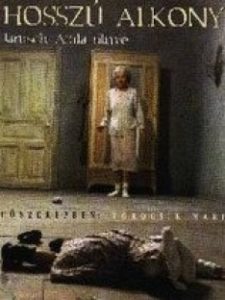 One of the finest unknown horror films of the nineties, an effectively subdued and surreal Hungarian adaptation of a Shirley Jackson story.
One of the finest unknown horror films of the nineties, an effectively subdued and surreal Hungarian adaptation of a Shirley Jackson story.
The basis of LONG TWILIGHT (HOSSZU ALKONY; 1997) was Shirley Jackson’s 1967 story “The Bus,” which like the film remains tragically little known. The film’s director was the brilliant, if frustratingly unprolific, Attila Janisch, who made LONG TWILIGHT in between two other, equally strange features: SHADOW ON THE SNOW (1992) and AFTER THE DAY BEFORE (2004).
An unidentified old woman, a veteran professor, is giving a lecture at a country farm. Things are fraught from the start: a little girl, from whom the old woman has “stolen” a locket that actually belongs to her (an event that’s explained only at the end of the film), tells her to “Go away ugly lady!,” and a seemingly kind man who gives the old woman a ride refuses to stop and let her off, honoring her request only after she insists.
Quickly getting lost amid deceptively placid rural scenery, the old woman boards a bus driven by an extremely unpleasant man. Among the passengers is a little girl who gives her a creepy stare.
That night, during a rainstorm, the old woman is kicked off the bus after witnessing a man knocked over and killed by the vehicle. Dropped off at a nondescript bus station, she hitches a ride with two thoroughly apathetic rednecks.
They let the old woman off at an inn that reminds her of the house in which she grew up. After dealing with several more unpleasant people in the inn’s jam-packed lobby the woman beds down in a strangely featureless room. There she’s afflicted by dreams involving a cute yet creepy teddy bear, only to wake up and find herself back on the bus. She’s dropped off at a station that looks much like the previous one she was dropped at, and the woman realizes that she truly is going home.
One thing about this film: it’s quite short, running a scant 70 minutes, but it leaves a long-lasting imprint.
Attila Janisch’s visual style is sure and confident, rendering the surreal aspects in powerfully concrete yet highly dreamlike fashion, while also imparting a touching account of an old woman’s doomed attempt at reconnecting with her past (her determination to “go home” obviously has multiple meanings). Janisch follows Shirley Jackson’s source tale fairly closely, only really diverting from the text in the final scenes, in which the material’s surreal edge reaches its apex.
Excellent use is made of the scenic country locations, which as visualized by cinematographer Medvigy Gabor in the early scenes have an eerie, foreboding glint. The remainder of the film, which takes place largely at night, is quite evocative, with real darkness in place of the blue filtered light that usually denotes nighttime. Another superlative is the lead performance by the sixtyish Mari Torocsik, who radiates hard-fought wisdom and experience (a refreshing change from the naïve ingénues of most modern horror films).
The pacing may be a bit overly glacial, an effect magnified by a padding-heavy narrative marked by a few too many lengthy shots of the heroine waking down country roads—a consequence of the fact that it was adapted from a short story. Otherwise, though, LONG TWILIGHT is largely impeccable in its disorienting, touching and deeply disquieting effect.
Vital Statistics
LONG TWILIGHT (HOSSZU ALKONY)
Budapest Filmstudio/Eurofilm Studio/Magyar Televizio Fiatal Muveszek Studioja
Director: Attila Janisch
Producer: Jolan Arvai, Ferenc Kardos, Peter Miskolczi
Screenplay: Andras Forgach
(Based on a story by Shirley Jackson)
Cinematography: Gabor Medvigy
Editing: Anna Kornis
Cast: Mari Torocsik, Imre Csuja, Andras Fekete, Janos Katona, Gabor Mate, Jozsef Szarvas, Denes Ujlaki, Jozsef Toth
